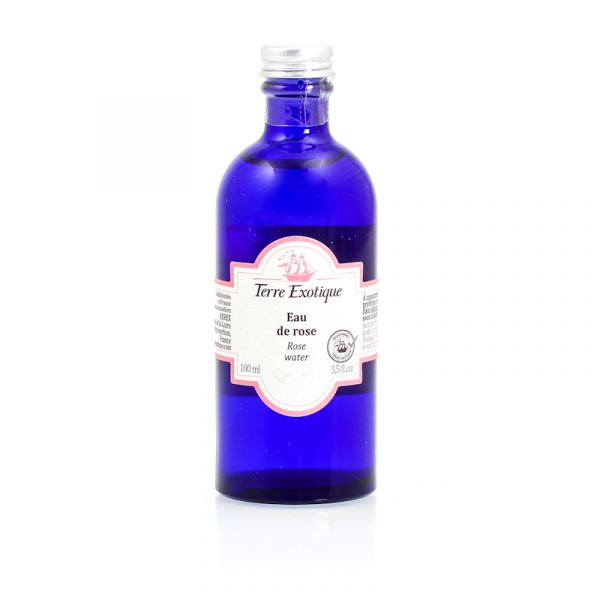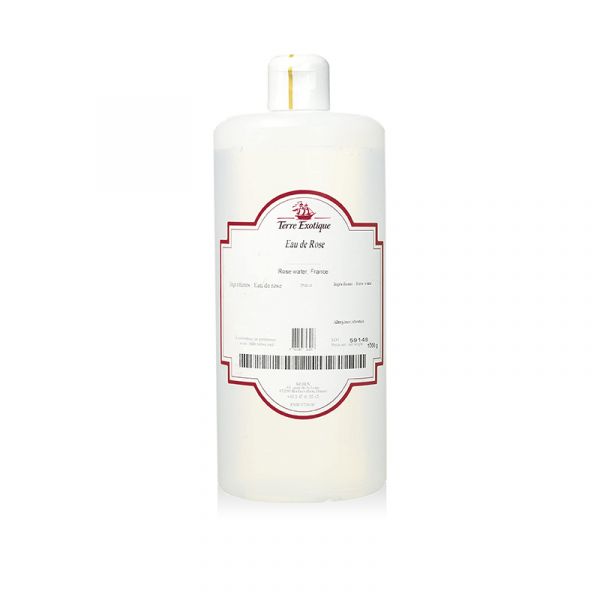







The Sweet Fragrance of Rose Water
Rose water has a delicate and floral aroma, characteristic of the rose from which it is extracted. Its scent is sweet, slightly spicy, and filled with complex floral notes. The scent of rose water is often described as romantic, feminine, and soothing.
In cooking, it is used to add a subtle and fragrant flavor to desserts, beverages, and dishes, while in aromatherapy and skincare products, its soothing aroma is appreciated for its relaxing properties.
How to Use Terre Exotique Rose Water in Cooking?
A very popular seasoning in the Middle East, it subtly flavors creams, ice creams, and oriental recipes. You can also drizzle it on your pancake batter or add it to the milk in your custards, pastry creams, clafoutis, and panna cottas.
Depending on the flowers and the distillation, the water can be more or less fragrant. It is therefore difficult to give exact quantities in recipes. A tip: taste it until it suits your liking!
How to Use Rose Water in Cooking?
Here are some usage ideas for cooking with rose water:
- - rose water non-alcoholic cocktail: mix 180 ml of lychee juice, 30 ml of raspberry pulp vinegar, 4 frozen cranberries, and your rose water. Refrigerate all ingredients for at least 20 minutes before serving;
- - pistachio and rose water cake: add rose water to your batter, then crush pistachios in the final step and add them. Bake for 40 minutes;
- - rose water-flavored pancakes: in a bowl, mix rose water with cream, then incorporate it into your pancake batter. Let it rest for an hour, then cook your pancakes. Serve them hot or cold;
- - rose water meringues: beat your egg whites until stiff, add a pinch of salt, sugar, and rose water. Pipe the meringues using a pastry bag, and bake for 40 minutes at 50°C, then 20 minutes at 100°C to dry them.
Roses and Their Botany
The roses used to produce rose water belong to the Rosaceae family, in the genus Rosa. Roses are beloved flowering shrubs worldwide for their beauty and enchanting fragrance. They are characterized by compound leaves and typically pink-colored flowers, although there are rose varieties of different colors.
How Is Rose Water Obtained?
Rose water is made through a steam distillation process of rose petals. This delicate and traditional process involves placing rose petals in a still with water. The still is heated, creating steam that passes through the rose petals.
The captured steam is then cooled, turning it into liquid, while the aromatic properties of the rose petals are also transferred into the water. The resulting liquid is rose water, a hydrosol rich in floral fragrance and beneficial substances for the skin.
Rose Water, a Fragrant Journey Through History
The origin of rose water dates back to ancient times. Ancient civilizations, including the Greeks, Romans, Persians, and Arabs, used rose water for medicinal, cosmetic, and culinary purposes. The use of rose water spread to the Middle East, where rose cultivation flourished.
An interesting anecdote is that Cleopatra bathed in milk and rose petals, drank rose petal tea, and used rose essential oil on her skin every day!
| Organic Agriculture | MAROC |
|---|---|
| Allergen | Absence |
| Native country | Maroc |
| Genus and botanical species | Rosa damascena |
| Ingredients | rose water** |
| Use: add 1 to 2 teaspoon(s) in your preparation. | |
| Nutritional Info | VN Energie pour 100 g (energy for 100g) : 0 kJ / 0 kcal VN Matière grasse (fat) : 0 g Dont acide gras saturés (of which saturated fat) : 0 g VN Glucides (carbohydrate) : 0 g Dont sucres (of which sugars) : 0 g VN Protéines (protein) : 0 g Vn Sel (salt) : 0 g |
| TRACES EVENTUELLES D'ALLERGÈNES | céleri, sésame, moutarde, fruits à coques. |
 Français
Français 